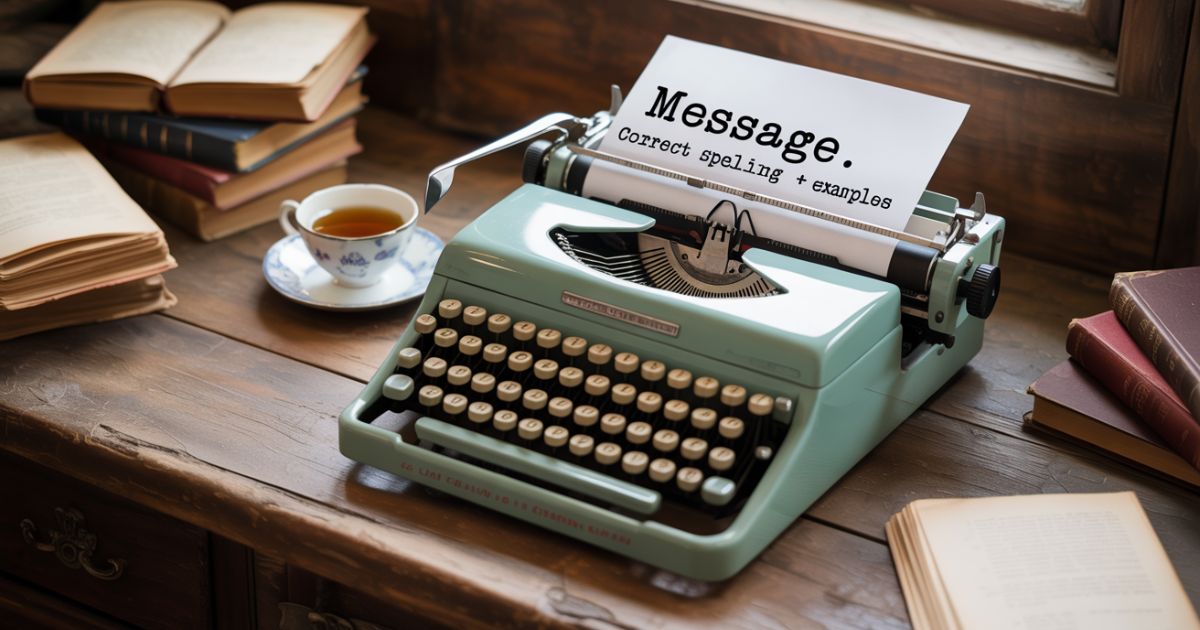We’ve all been there typing quickly, maybe late at night or in a hurry, and then it happens: you second-guess yourself. Is it “messege” or “message”? Which one is correct? And why does it look wrong both ways sometimes?
Let’s set the record straight once and for all. In this article, we’ll dive into the correct spelling, explore why this confusion happens, and give you some real-life examples to help you remember the right form.
What’s the Correct Spelling: Messege or Message?
Let’s get straight to the point:
The correct spelling is message.
The word “messege” is a common misspelling. While it might look right at first glance, especially when typing quickly or phonetically, it’s not a recognized word in the English language.
✅ Correct: Message
❌ Incorrect: Messege
If you type “messege” into most word processors or even your phone, you’ll likely see a red squiggly line underneath it. That’s your spell checker telling you, “Hey, something’s not quite right here!”
Why Do People Confuse “Messege” with “Message”?
Spelling errors like this are incredibly common, especially with words that are heard more often than they are written.
Here are a few reasons why “messege” sneaks into texts, emails, and even professional documents:
1. Phonetic Spelling
English can be a tricky language because words often aren’t spelled the way they sound. The word “message” is pronounced /ˈmes.ɪdʒ/—and that soft “j” sound at the end throws people off. It sounds like it should be “messege,” with a soft “g” sound mimicking the “j” sound.
2. Typing Quickly
When we type fast—especially on smartphones or touchscreen devices—we’re more prone to errors. “Messege” is just one quick slip away from “message.”
3. Autocorrect Isn’t Perfect
Sometimes, autocorrect tries to be helpful and ends up making things worse. If “messege” gets added to your personal dictionary accidentally, it may stop flagging the error altogether.
The Meaning of “Message”
To clear up any remaining confusion, let’s define what a “message” is:
A message is a piece of information or communication that is conveyed from one person to another, either verbally, written, or electronically.
Examples of a Message:
- A text message you send your friend saying, “Running late!”
- A voicemail left on someone’s phone.
- An email to your boss about tomorrow’s meeting.
- A handwritten note on someone’s desk.
Real-Life Scenario Examples
Sometimes, seeing a word in action helps it stick. Let’s look at a few realistic situations to better understand the usage of “message” and spot when someone might accidentally use “messege.”
📱 Scenario 1: The Text Message
Incorrect:
Hey, did you get my messege last night?
Correct:
Hey, did you get my message last night?
Explanation: Whether it’s through WhatsApp, SMS, or iMessage, the correct word is always message.
🖥️ Scenario 2: Workplace Communication
Incorrect:
I left you a messege on Slack with the project updates.
Correct:
I left you a message on Slack with the project updates.
Tip: In professional settings, getting spelling right matters. Small errors like this can affect how you’re perceived.
📬 Scenario 3: Leaving a Note
Incorrect:
He wrote a messege on the whiteboard before he left.
Correct:
He wrote a message on the whiteboard before he left.
Insight: Whether digital or handwritten, if it conveys information, it’s a message—not a “messege.”
Synonyms of “Message” to Help Reinforce Its Meaning
If you’re still unsure, it can help to look at synonyms of the word “message.” This gives more context about what it means and how it’s used.
Common Synonyms:
- Note
- Communication
- Memo
- Notification
- Announcement
- Dispatch
- Text
For example:
- She sent a quick note to say thank you. (Synonym of message)
- I received an urgent notification from the app. (Again, a type of message)
Knowing these can help reinforce the idea that “message” is the correct and commonly accepted spelling for this type of communication.
How to Remember the Correct Spelling: Message
Need a simple trick to remember how to spell message?
Try this:
🔤 Memory Tip:
“Message has two S’s and ends with ‘age’ – like a passage in a book.”
Both message and passage share that “-age” ending, which can help make the spelling feel more familiar.
Another way:
- Think of the word “mess” (as in something you need to clean up) inside the word.
- Add “-age” to it → mess + age = message
You’re sending a “mess” of thoughts to someone across an “age” of communication! Okay, it’s a stretch, but memorable.
Final Thoughts: Spelling Matters
In today’s world of fast typing, social media, and constant messaging apps, it’s easy to overlook small spelling errors. But knowing the correct spelling of common words like message can make a big difference, especially in professional or academic settings.
To wrap things up:
- ✅ “Message” is the correct spelling.
- ❌ “Messege” is a common misspelling.
- Use “message” to describe any form of communication sent from one person to another.
- Practice the word in different contexts to reinforce it.
- A little attention to detail goes a long way in clear and polished communication.


